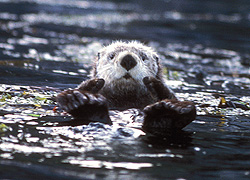When it comes to conservation research, the University of California, Santa Cruz, ranks as the fourth most productive institution in North America, according to a study published in the October issue of Conservation Biology. The study compared the performance of research faculty from 315 colleges and universities in terms of the number of academic papers published and their subsequent impact in the field.
"We're thrilled that we're in the top five," said Stephen Thorsett, dean of physical and biological sciences. "Environmental science and policy is one item on Chancellor Blumenthal's new list of six major themes for the campus, and this study is basically a measure of how strong we already are."
The study's authors, led by Jacqualine Grant of Michigan Technological University, used a measurement called the Hirsch index to gauge each institution's research impact. The index balances the total number of publications against how often other articles have cited those papers.
Citations are a useful indication of respect. Each published article contributes an idea or a finding to a field of study, and subsequent researchers acknowledge that contribution each time they cite a paper. In general, the more insightful the idea or innovative the finding, the more often it will be cited.
The Hirsch index gives smaller institutions, like UCSC, a chance against larger ones with more overall publications. In the Conservation Biology study, the seven universities ranked immediately below UC Santa Cruz had produced more conservation papers than UCSC scientists, but the UCSC papers tended to be cited more often.
Such rankings are common in other disciplines, and other UCSC departments have fared well in them, including scoring first among U.S. universities in space sciences (in 2003) and physics (in 2000 and 2007), and second worldwide in physical sciences (in 2001). But this study was the first to attempt such rankings for the relatively new field of conservation biology. The attention underscores the rigorous scientific work that has come to dominate the field, which in its early years was often regarded as an offshoot of environmentalism.
"Our campus and other UC campuses have been really paving the way with recognition of conservation biology as an academic endeavor," said Peter Raimondi, professor and chair of ecology and environmental biology. "There are two reasons why: The campus lends itself to the ideas of conservation biology because of the natural setting we're in. And--for marine groups--around Monterey Bay there's a huge number of affiliated institutions that are interested in similar topics, so there's a synergy."
Marine research at UCSC includes now-classic studies of sea otters and kelp forests as well as work on elephant seal biology, seabird migration, whale populations, island conservation, and a recent breakthrough for loggerhead sea turtles, among other projects.
That's not to say that UCSC biologists have overlooked conservation research on land. Among its faculty, the campus can count ecologist Michael Soulé, professor emeritus of environmental studies, who co-founded the Society for Conservation Biology and has been called the "father of conservation biology." John Thompson, professor of ecology and evolutionary biology, is a leading authority on coevolution and its implications for conservation. President-elect of the American Society of Naturalists, Thompson was recognized as one of the most highly cited researchers in "ecology/environment" in a 2003 analysis.
Thompson was the founding director of the STEPS Institute for Innovation in Environmental Research, created in 2002 to enable interdisciplinary research between members of the Division of Physical and Biological Sciences and the Division of Social Sciences, along with collaborators from organizations outside UCSC. The STEPS Institute is presently under the interim directorship of James Estes, adjunct professor of marine sciences.
In the study's ranking, UC Santa Cruz appears just under list-toppers Oregon State University, UC Santa Barbara, and UC Davis. UC Berkeley ranked sixth; in all, nine UC schools made it into the top 40. The study's authors represented institutions ranked seventh (University of Washington, Seattle), eleventh (University of Montana, Missoula), fourteenth (University of Florida, Gainesville), and thirtieth (Michigan Technological University).
"It's very flattering," said Sheldon Kamieniecki, dean of social sciences. "We have a number of very good people here whose research is being paid attention to across the country."
"Our natural reserves provide a terrific opportunity for scholars to come here and do research in this area and do it well--to provide insights you wouldn't get in any other part of the country," Kamieniecki added. "It's another example of how taking advantage of our natural setting has been fundamental to the success of our campus."



